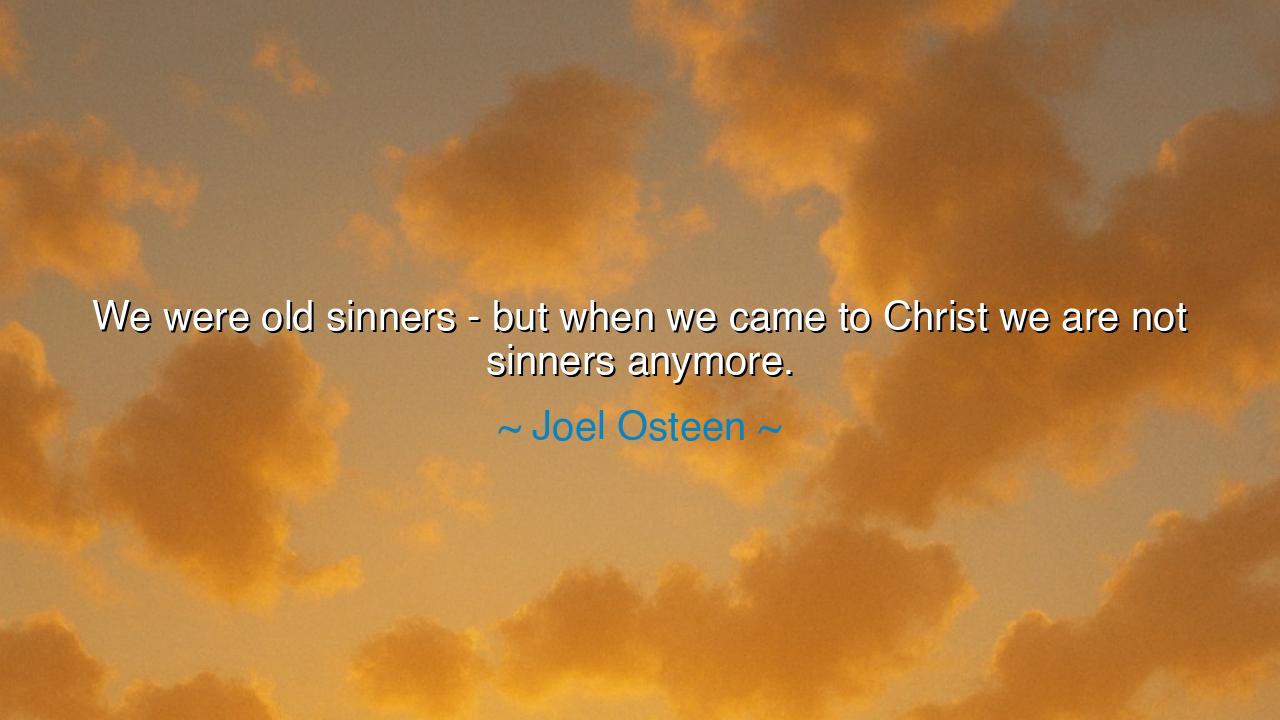
We were old sinners - but when we came to Christ we are not






There is a profound and liberating truth in the words of Joel Osteen, who said, “We were old sinners—but when we came to Christ we are not sinners anymore.” In this declaration lies the heartbeat of redemption itself — the transformation of identity that takes place when the soul encounters divine grace. It is not a denial of human weakness, but a proclamation of spiritual renewal. For the one who comes to Christ is not simply forgiven; he is made new. The stains of the past no longer define him, for he has crossed from the realm of guilt into the light of grace.
The origin of this truth flows from the words of Scripture, especially from the Apostle Paul, who wrote, “If anyone is in Christ, he is a new creation; the old has passed away, the new has come.” The early Church understood this not as a symbol, but as a miracle — that through faith and repentance, a person is spiritually reborn. The old sinner dies with Christ, and a new life begins, radiant with divine presence. Osteen’s quote captures this eternal transformation: it is not behavior that first changes, but being itself. The soul once bound by sin now bears the mark of the Redeemer and walks as a child of light.
To say that we “are not sinners anymore” is to acknowledge the power of divine adoption. Before Christ, the soul stands condemned, estranged from its Maker; but through Him, it is embraced, cleansed, and crowned with righteousness. The believer no longer lives under the label of the fallen man, but under the name of the redeemed. The identity of sin gives way to the identity of sonship. This is the mystery of grace — that God not only forgives but restores dignity, not only erases sin but writes a new destiny upon the heart.
Consider the story of John Newton, the slave trader who became the author of Amazing Grace. In his youth, Newton was a man of vice and cruelty, his hands stained by the suffering of others. But one stormy night at sea, when death seemed certain, he cried out to God for mercy — and mercy answered. From that day on, his life was transformed. He became a minister, a voice of compassion, and an enemy of the very slave trade he once served. Newton’s life echoes Osteen’s truth: he was once a sinner, but through Christ, he became a vessel of grace. His past did not vanish, but it was redeemed — turned into a testimony of divine power.
This transformation does not mean the absence of struggle, but the presence of new identity. The old self may whisper from the shadows, but it no longer rules. The believer walks in freedom, not because he has become flawless, but because his flaws no longer define him. To come to Christ is to step out of the courtroom of judgment and into the household of mercy. The enemy may accuse, but the Father calls him “beloved.” The past may haunt, but heaven declares, “All things are made new.”
In this truth lies both comfort and challenge. Comfort, because no one is beyond redemption — the worst sinner can become a saint through faith. Challenge, because those who have been made new must now live as new creations. To accept grace is to accept responsibility: to live with humility, gratitude, and holiness. The believer must no longer speak of himself as one trapped in sin, but as one set free — walking in the light of what God has already declared true.
Let this be the lesson to all who seek peace of soul: do not cling to the names of your past. The moment you turn to Christ in faith, your identity changes. You are no longer defined by failure, but by forgiveness; not by shame, but by salvation. Live as one reborn — with eyes lifted toward heaven, with heart cleansed by grace, and with courage to walk as a child of God, not a prisoner of sin.
So remember, as the ancients would say: the fire that consumes the old purifies the new. You were once a sinner, but now you are redeemed. The cross has spoken your freedom, and eternity itself bears witness. You are not who you were — you are who He has made you to be.






AAdministratorAdministrator
Welcome, honored guests. Please leave a comment, we will respond soon